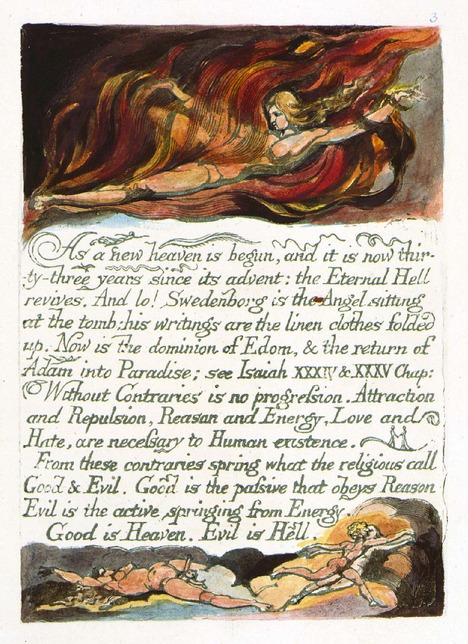First posted Sept 2016
Isaiah 20
[1] In the year that Tartan came unto Ashdod, (when Sargon the king of Assyria sent him,) and fought against Ashdod, and took it;[2] At the same time spake the LORD by Isaiah the son of Amoz, saying, Go and loose the sackcloth from off thy loins, and put off thy shoe from thy foot. And he did so, walking naked and barefoot.
[3] And the LORD said, Like as my servant Isaiah hath walked naked and barefoot three years for a sign and wonder upon Egypt and upon Ethiopia;
[4] So shall the king of Assyria lead away the Egyptians prisoners, and the Ethiopians captives, young and old, naked and barefoot, even with their buttocks uncovered, to the shame of Egypt.
[5] And they shall be afraid and ashamed of Ethiopia their expectation, and of Egypt their glory.
[6] And the inhabitant of this isle shall say in that day, Behold, such is our expectation, whither we flee for help to be delivered from the king of Assyria: and how shall we escape?
Marriage of Heaven and Hell"I also asked Isaiah what made him go naked and barefoot three
years? he answerd, the same that made our friend Diogenes the
Grecian."
Blake's Memorable Fancy on Plates 12 and 13 of Marriage of Heaven and Hell uses the Hebrew prophets Isaiah and Ezekiel to emphasize the point that a conventional mindset that follows the popular mores fails to understand the voice of prophecy. Isaiah and Ezekiel developed their ability to listen to the voice that spoke from within. To convey the message they received, they occasionally behaved in ways which startled their contemporaries. They sought to change their societies by demonstrating what were the consequences of continuing in behaviors which were leading to destruction. Blake further emphasized the technique of shocking people out of habitual nonproductive attitudes by indicating that Isaiah attributed his going naked and barefoot for three years to the influence of Diogenes who had practiced the same kinds of outrageous stunts to his Greek contemporaries.Blake was not averse to looking to the Greek philosophy of Diogenes to reinforce his principle that man could not depend upon only data from his senses to interpret his environment and experience. Isaiah, Ezekiel and Diogenes risked being outcast from their societies in order to encourage men to have their intellect and courage opened to perceiving the limitations of conventional thinking. In writing Marriage of Heaven and Hell Blake was engaging in similar strategies to those used by his heroes. He was presenting his ideas in forms and statements which were unacceptable to his public. He risked the ridicule of the critics and the indifference of potential readers by writing poetry which seemed ridiculous on the surface, and making images which appeared unpolished and obscure to current taste.
Marriage of Heaven and Hell, PLATE 12, (E 38)
"A Memorable Fancy.
The Prophets Isaiah and Ezekiel dined with me, and I asked
them how they dared so roundly to assert. that God spake to them;
and whether they did not think at the time, that they would be
misunderstood, & so be the cause of imposition.
Isaiah answer'd. I saw no God. nor heard any, in a finite
organical perception; but my senses discover'd the infinite in
every thing, and as I was then perswaded. & remain confirm'd;
that the voice of honest indignation is the voice of God, I cared
not for consequences but wrote.
Then I asked: does a firm perswasion that a thing is so, make it so?
He replied. All poets believe that it does, & in ages of imagination
this firm perswasion removed mountains; but many are not capable
of a firm perswasion of any thing.
Then Ezekiel said. The philosophy of the east taught the first
principles of human perception some nations held one
principle for the origin & some another, we of Israel taught
that the Poetic Genius (as you now call it) was the first
principle and all the others merely derivative, which was the
cause of our despising the Priests & Philosophers of other
countries, and prophecying that all Gods [PL 13] would at last be
proved. to originate in ours & to be the tributaries of the
Poetic Genius, it was this. that our great poet King David
desired so fervently & invokes so patheticly, saying by this he
conquers enemies & governs kingdoms; and we so loved our God.
that we cursed in his name all the deities of surrounding
nations, and asserted that they had rebelled; from these opinions
the vulgar came to think that all nations would at last be
subject to the jews.
This said he, like all firm perswasions, is come to pass, for all
nations believe the jews code and worship the jews god, and what
greater subjection can be
I heard this with some wonder, & must confess my own
conviction. After dinner I ask'd Isaiah to favour the world with
his lost works, he said none of equal value was lost. Ezekiel
said the same of his.
I also asked Isaiah what made him go naked and barefoot three
years? he answerd, the same that made our friend Diogenes the
Grecian.
I then asked Ezekiel. why he eat dung, & lay so long on his
right & left side? he answerd. the desire of raising other men
into a perception of the infinite this the North American tribes
practise. & is he honest who resists his genius or conscience.
only for the sake of present ease or gratification?"










